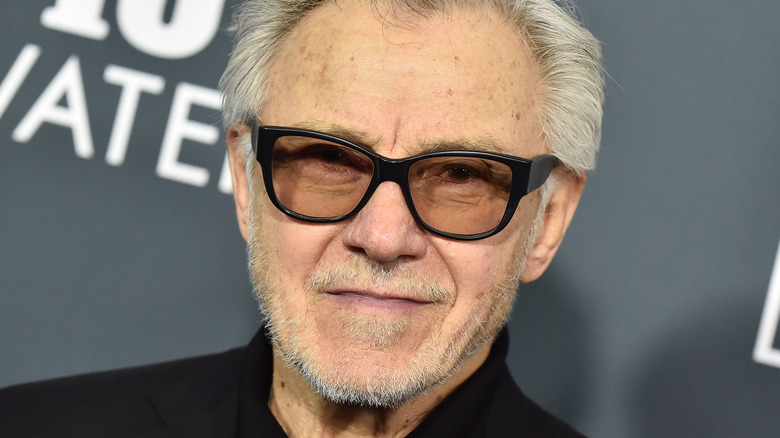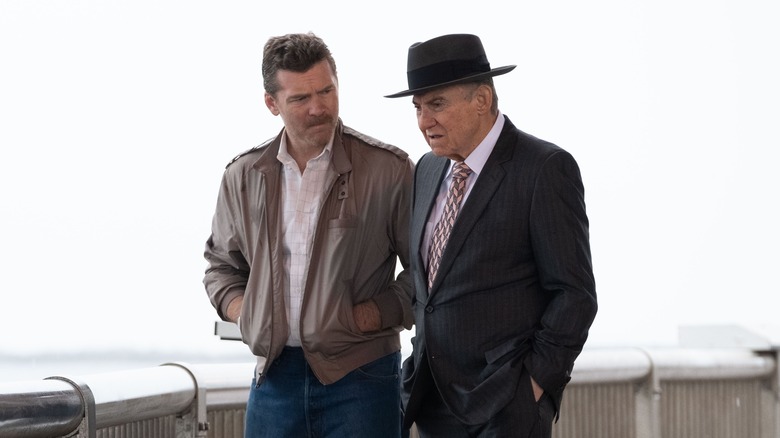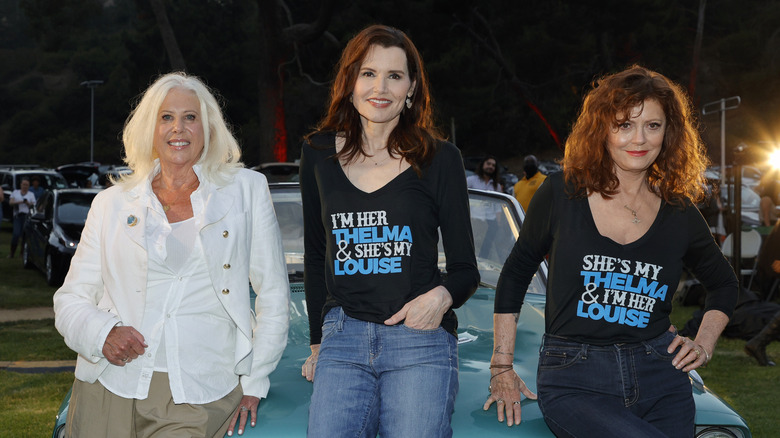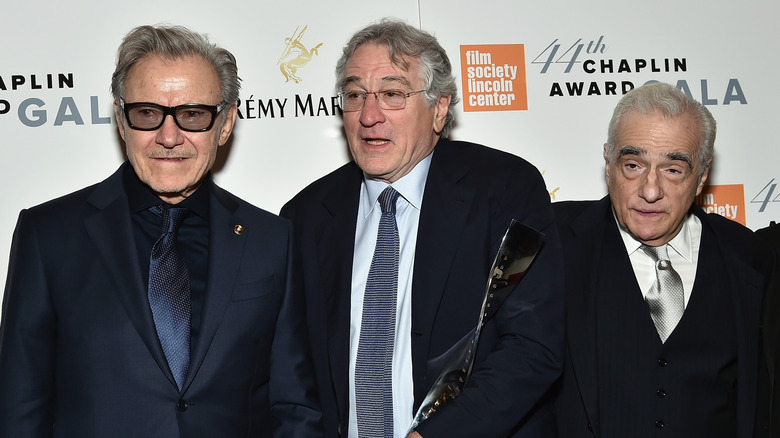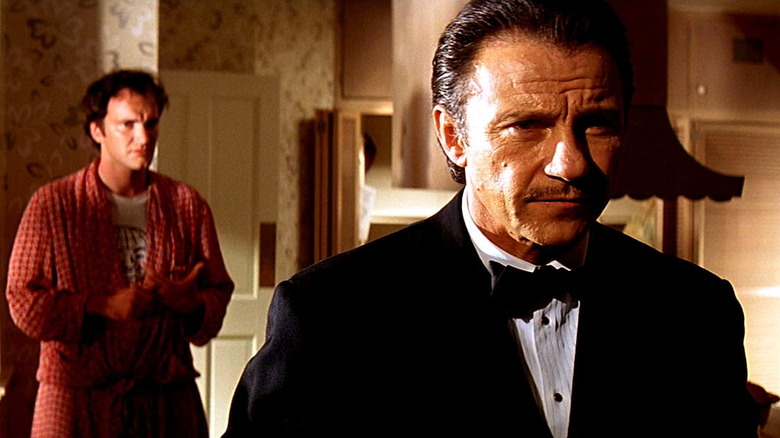Harvey Keitel Brings A Notorious Mobster To Life In Lansky - Exclusive Interview
As one of the most prolific actors working in the entertainment business today, film legend Harvey Keitel has earned a reputation for delivering one knockout performance after another in the feature he's appeared in over the past five-plus decades.
Keitel's big-screen debut came in 1967 in "Who's That Knocking at My Door," directed by then-NYU film school student Martin Scorsese. Since their auspicious industry debuts, Keitel and Scorsese have reunited five more times — including roles for Keitel in the director's crime classics "Mean Streets" and "Taxi Driver" — and most recently for the 2019 gangster epic "The Irishman," also starring Al Pacino, Robert De Niro, and Joe Pesci.
Of course, Scorsese isn't the only acclaimed filmmaker Keitel has collaborated with over the years. His other credits include the smash crime thrillers "Reservoir Dogs" and "Pulp Fiction" for Quentin Tarantino and the war drama "The Duellists" and crime adventure "Thelma and Louise" under the auspices of Ridley Scott. Keitel's other credits include his Oscar-nominated role for playing real-life gangster Mickey Cohen in director Barry Levinson's "Bugsy," the lauded biopic of criminal underworld figure Benjamin "Bugsy" Siegel (Warren Beatty).
Now, 30 years after the release of "Bugsy" — which also starred Ben Kingsley as Meyer Lansky — Keitel assumes the role of the notorious mobster in the new crime drama "Lansky." Inspired by true events, "Lansky" finds the aging and cancer-ridden crime figure in Miami Beach, recounting his life's story for journalist David Stone (Sam Worthington). The caveat, as Stone learns, is that his series of interviews with the legendary "Mob's Accountant" are for a biography that can only be published after Lansky's death. However, since Lansky had allegedly stashed $300 million of his fortune, the federal government is tracking the meetings between the two men, and starts pressuring Stone to manipulate Lansky in hopes the retired gangster will give up information on where his money is hidden.
In an exclusive interview with Looper, Keitel discusses playing Lansky and other mob figures, and gives his thoughts on his Scorsese and Tarantino, as well as the recent 30th anniversary celebration of the release of Scott's landmark film "Thelma and Louise."
Keitel is thrilled by the opportunity of entering the minds of mobsters
You played Angelo Bruno in "The Irishman," and now you're playing his associate, Meyer Lansky, in "Lansky." I mean, these are pretty ominous historical figures. Does that work on your psyche going in to play a role like Lansky or Bruno?
Not at all. It's an opportunity. I mean, I don't engage myself in these kinds of movies because they're mob movies. To me, they're stories that take place in a mob milieu. So, it's what experience I can gather from entering into the idea of trying to create this character. That's my gift that I have, that I received, the opportunity to invade myself if you will, to slaughter myself, to resurrect myself, and hopefully in that, come up with some relationship to the character.
The root of Lansky deals with Meyer Lansky telling his life story to David Stone for a biography to be published after his death. Now, if you could go back to 1981 and you were given one question that you could ask Meyer Lansky — and not "Where is that $300 million?" — what question would you ask him?
I'd say, "Meyer, what kind of knishes do you like?" [smiles]
You have the resonating line in "Lansky" when Lansky tells Stone, "I don't have the power to change my past. I only have the power to change the perception of it." That's what Meyer Lansky's hope was for the book that was being written about him in the film. But do you feel the movie "Lansky" will change the perception of who Meyer Lansky was?
I do, because the other way around, it's like typecasting. You only play this character to any actor that you know. "Oh, they always played this type of character. They're always a bad guy. They're always a good guy," blah, blah, blah. For me, it's not about that. That's not why I entered into the theater. I entered into the theater for the same reason you did, and everybody involved with us here today, to realize something about themselves. And that's always [the] changing gift. [You] wake up in the morning. You're about to have some experiences, but you didn't expect that's going to influence you in some way. To be able to create a dance, a poem, a piece of music, a character is what theater was created of, to go in and for the community to enter together, and try and realize what their desires are, and their anxieties and their wishes.
Learning endurance and being in an enduring movie
You served in the Marines, and being from a military family, I thank you for your service. But I know that you found Parris Island a place of creativity, oddly enough. And you thrived there because you learned to confront your fears. Do you still draw from that experience? And did you apply that in any way to your portrayal of Meyer Lansky?
Absolutely. All the time. I'm still scared, but I have a bit of a handle on it. That's what I learned on Parris Island. I learned to endure.
Speaking of endurance, lately I'm seeing a lot of coverage of the 30th anniversary of "Thelma and Louise," which you are a pivotal part of. I mean, you have that classic scene, chasing Susan Sarandon and Geena Davis down before they drive off the cliff. What do you think accounts for the staying power of that film for the past three decades?
Callie Khouri's brilliant writing of that script. Callie was an actress, by the way, before she became a writer. Ridley's desire to make that movie, to tell that story. Geena and Susan's passion to tell a story about these women. I don't want to describe the movie, because you will all have seen it, but they wanted to tell the story about what these women had to go through in order to be women. And Callie Khouri's script, like I say, was a beautiful piece of work. And I was really happy that all of us came together to make the movie.
Back to the beginning with Martin Scorsese and Robert De Niro
Well, it's amazing that 30 years have passed with "Thelma and Louise" — here and gone in a blink. And I'm thinking back to your debut with Martin Scorsese in 1967 with "Who's That Knocking at My Door?" only to 50-some years later, being with him again with "The Irishman." What sort of feelings does that evoke, knowing that you spent a span of 50 years with this legendary filmmaker? Most people don't get five minutes with him, but you've had five decades with him. That's got to make you emotional in a way, I would think.
I miss the corn beef sandwiches we had at Katz's Deli that we shared. One day, he had the money. Next day, I had the money, or we would split the sandwich. Sure, those were forming days. And to meet Marty at that time of his life, and he me, I guess, at that time in my life was just ... I don't know what to say. It was serendipity. I have to have a better word. It was a tree growing in Brooklyn.
And a tree that added that big leaf named Robert De Niro, too.
Yeah, because I met Robert after I met Marty. I met Marty at NYU with "Who's That Knocking." Robert came later, who I met at the Actors Studio, on the street outside the Actors Studio. And then we came to do "Mean Streets."
Reflecting on the power of Quentin Tarantino's creativity
It's been almost 30 years since you worked with Quentin Tarantino and "Reservoir Dogs" was released, and then came "Pulp Fiction" with one of the greatest characters ever, with your turn as the Wolf. The sad thing is, Quentin Tarantino says that at movie number 10, he's done, and No. 9 was "Once Upon a Time ... in Hollywood." If he gives you the call, you have to be involved with his swan song, don't you? For his final movie?
I can only hope so. I do want to say one thing, though, about "Once Upon a Time ... in Hollywood." That was number what? Nine?
Yes. Number nine.
Yeah. Well, I just want to make this note that for me, the part of his movie that has to do with the event of Sharon Tate, to me is one of the most powerful love stories I've ever seen onscreen. And this moment I get chills when I think about it and the power of Quentin's creativity and love to create that story about Sharon. Blows my mind. If he was ever known for greatness, I think those scenes depicting the event that Sharon Tate went through are the most powerful, maybe, that he's ever done.
Your performance in "Bugsy" earned you your well-deserved Oscar nomination. I think that you should have been nominated a lot more and won a lot more. But then again, the way I look at it is, your award — or reward — is all the work you've done with Martin Scorsese, Quentin Tarantino, and Ridley Scott. It's better than any sort of award like an Oscar. To me, the fact that you work with those guys makes you a winner.
I would not trade it in for an Oscar, but there were others. There was Abel Ferrara ["Bad Lieutenant"] and Lina Wertmüller ["Camorra (A Story of Streets, Women and Crime)"], and a lot of other people, also.
Directed by Eytan Rockaway, and also starring AnnaSophia Robb, Minka Kelly, and John Magaro as the young Meyer Lansky, "Lansky" is playing in select theaters and on video on demand.
